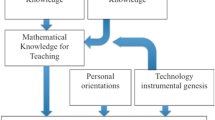Abstract
The current push to marry off mathematics with social justice compels one to ask such critical questions as “What is social justice?” and “How does (or can) mathematics look and act when viewed in/through the lenses of social justice?” Taking a critically reflective approach, this article draws the reader into a discussion of what is amiss in the currently promoted picture-perfect marriage of mathematics and social justice, presenting perspectives on both the content and context of mathematics teaching and learning. In this article, the author’s account of her experience in teaching a mathematics curriculum course for prospective middle years' teachers highlights a call to re-imagine the relationship between mathematics and social justice as more than a perfunctory integration of a “statistics and figures” approach. The author’s reflections acknowledge the complexity and potentiality of the relationship while challenging current status quo practices and paradigms in mathematics education.
Similar content being viewed by others
References
Abramovich, S., & Kveong Cho, E. (2006). Technology as a medium for elementary preservice teachers’ problem-posing experience in mathematics. The Journal of Computers in Mathematics and Science Teaching, 25(4), 309–323.
Appelbaum, P., & Davila, E. (2007). Math education and social justice: Gatekeepers, politics and teacher agency. Philosophy of Mathematics Education Journal, 22, 1–23.
Atweh, B., Forgasz, H., & Nebres, B. (2001). Sociocultural research on mathematics education: An international perspective. NJ: Lawrence Erlbaum Associates.
Bose, B. (2005). Professional development for social justice: Rethinking the ‘‘end in mind”. Journal of Research in Teacher Education, 3, 78–100.
Brown, T., Hanley, U., Darby, S., & Calder, N. (2007). Teachers’ conceptions of learning philosophies: Discussing context and contextualising discussion. Journal of Mathematics Teacher Education, 10, 183–200.
Burton, L. (Ed.). (2003). Which way social justice and mathematics education? London: Praeger Publishers.
Childress, V. (1996). Does integrating technology, science, and mathematics improve technological problem solving? A quasi-experiment. Journal of Technology Education, 8(1), 16–26.
Cotton, T. (1996). Flipping the coin: Models for social justice in the mathematics classroom. Proceedings of the British Society for Research into Learning Mathematics, 16(3), 15–20.
Cotton, T., & Hardy, T. (2004). Problematising culture and discourse for mathematics education research. In P. Valero & R. Zevenbergen (Eds.), Researching the socio-political dimensions of mathematics education: Issues of power in theory and methodology (pp. 85–103). Dordrecht, The Netherlands: Kluwer Academic Publishers Group.
Davidson, D. (1995). What does integration of science and mathematics really mean? School Science and Mathematics, 95(5), 226–230.
de Freitas, E., & Nolan, K. (2008). Opening the research text: Mathematics education under cross-examination. Symposium presented at the annual meeting of the American educational research association (AERA), New York, NY, 24–29 March 2008.
Gindin, S. (2002). The terrain of social justice, The Packer Social Justice Lecture. Toronto: The CSJ Foundation for Research and Education.
Gutstein, E. (2003). Teaching and learning mathematics for social justice in an urban, Latino school. Journal for Research in Mathematics Education, 34(1), 37–58.
Gutstein, E. (2006). Reading and writing the world with mathematics: Toward a pedagogy for social justice. New York: Routledge.
Klein, M. (1998). How teacher subjectivity in teaching mathematics-as-usual disenfranchises students. In P. Gates (Ed.), Proceedings of the first international conference of the mathematics education and society group. University of Nottingham.
Kumashiro, K. K. (2004). Against common sense: Teaching and learning toward social justice. New York: RoutledgeFalmer.
Lerman, S. (2001). Cultural, discursive psychology: A sociocultural approach to studying the teaching and learning of mathematics. Educational Studies in Mathematics, 46(1–3), 87–113.
Mukhopadhyay, S. (1998). When Barbie goes to classrooms: Mathematics in creating a social discourse. In C. Keitel (Ed.), Social Justice and Mathematics Education (pp. 150–161). Berlin: Freie Universitat Berlin.
Nolan, K. (2006). Teaching mathematics in middle years: A course outline for EMTH 390. Regina, CA: University of Regina.
Nolan, K. (2007a). How should I know? Preservice teachers’ images of knowing (by heart) in mathematics and science. The Netherlands: Sense Publishers.
Nolan, K. (2007b). Practice what (and when) you preach: Discomforting narratives of change in the teaching and learning of mathematics. Paper presented at the annual conference of the British educational research association, London, UK, 5–8 September 2007.
Norton, S., McRobbie, C., & Cooper, T. (2000). Exploring secondary mathematics teachers’ reasons for not using computers in their teaching: Five case studies. Journal of Research on Computing in Education, 33(1), 87–109.
Pang, J., & Good, R. (2000). A review of the integration of science and mathematics: Implications for further research. School Science and Mathematics, 100(2), 73–82.
Povey, H. (2003). Teaching and learning mathematics: Can the concept of citizenship be reclaimed for social justice? In L. Burton (Ed.), Which way social justice in mathematics education (pp. 51–64). CT: Praeger Publishers.
Roth, W.-M. (1993). Problem-centered learning for the integration of mathematics and science in a constructivist laboratory: A case study. School Science and Mathematics, 93(3), 113–122.
Shaffer, D. W., & Kaput, J. J. (1998). Mathematics and virtual culture: An evolutionary perspective on technology and mathematics education. Educational Studies in Mathematics, 37(2), 97–119.
Skovsmose, O. (1994). Towards a philosophy of critical mathematics education. Dordrecht, The Netherlands: Kluwer Academic Publishers Group.
Skovsmose, O. (2005). Traveling through education: Uncertainty, mathematics, responsibility. Rotterdam, The Netherlands: Sense Publishers.
Stocker, D. (2007). Maththatmatters: A teacher resource linking math and social justice. Ottawa: Canadian Centre for Policy Alternatives.
Stocker, D., & Wagner, D. (2008). Talking about teaching mathematics for social justice: A conversation with David Stocker and David Wagner. Our Schools, Our Selves, 17(2), 69–81.
University of Regina. (2007). Shaping who we are: Faculty of education program renewal document. Regina, SK: Faculty of Education.
Valero, P., & Zevenbergen, R. (Eds.) (2004). Researching the socio-political dimensions of mathematics education: Issues of power in theory and methodology. Dordrecht, The Netherlands: Kluwer Academic Publishers Group.
Author information
Authors and Affiliations
Corresponding author
Rights and permissions
About this article
Cite this article
Nolan, K. Mathematics in and through social justice: another misunderstood marriage?. J Math Teacher Educ 12, 205–216 (2009). https://doi.org/10.1007/s10857-009-9111-6
Received:
Accepted:
Published:
Issue Date:
DOI: https://doi.org/10.1007/s10857-009-9111-6




